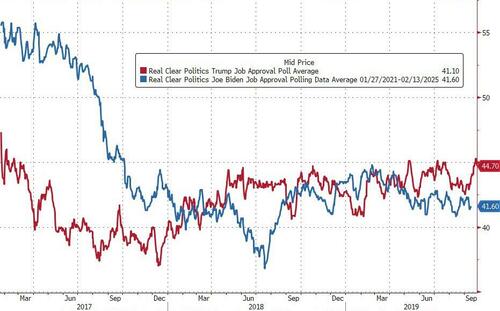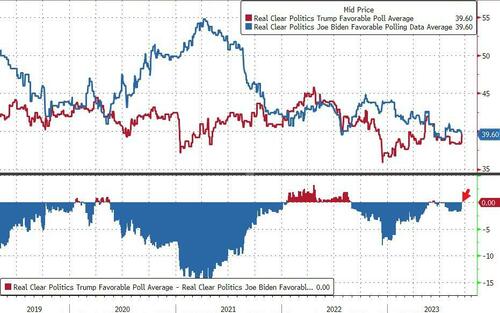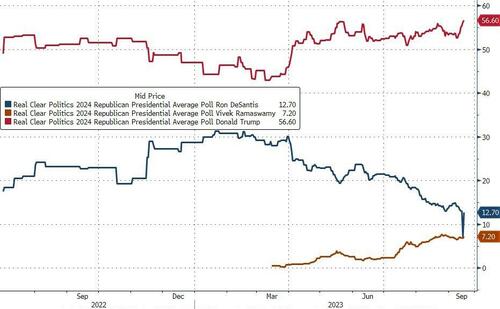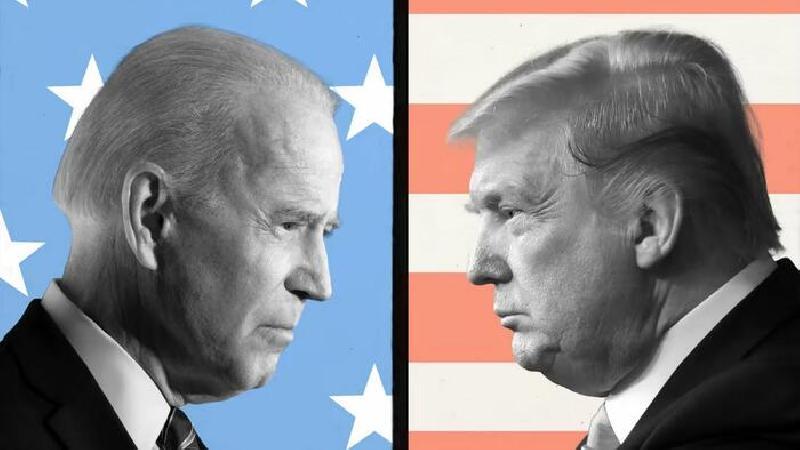Former President Donald Trump would claim victory over President Biden, according to a pair of recent polls from CBS News/YouGov and Harvard Harris (which no longer disclose how many Democrats were oversampled).
When broken down by party identification (or lack thereof), 57% of independents chose Trump vs. Biden’s 42%, while just 34% of everyone polled thought Biden would be able to finish a second term if reelected.
Biden is well below Trump in terms of job approval at this point in their terms…

But Trump and Biden are tied for favorability, with the recent trend towards Trump…

44% think Biden wouldn’t be able to carry out an entire second term, while most voters say Trump would.
Registered voter respondents were also asked if they find Trump and Biden to be physically and mentally healthy enough to serve as president, finding that only 28 percent of voters think Biden is physically well enough, while most say the 45th president is. Just 16 percent of voters say only Biden is physically healthy enough to serve, while 44 percent say Trump is the only one who is healthy enough. Another 12 percent see them both as physically fit versus 28 percent who say neither are. -Breitbart
Trump’s lead over Biden increased in the Harvard-Harris poll, at 44% vs. 40%. Trump would lead Vice President Kamala Harris by 46% to 40%.
(Anyone else getting a ‘potentially sensitive content’ warning on the Trump electoral map?)
https://twitter.com/legitbrittFLA/status/1702794246598631845
Ron who?
Meanwhile, RealClear Politics‘ Sean Terende asks: “What happened to the DeSantis campaign?”
DeSantis isn’t quite a penny stock, but he briefly fell behind Vivek Ramaswamy among bettors and languishes with primary season voters at just 14.9% in the RealClearPolitics Average.

What went wrong? It’s important to acknowledge up front that it is still early. As late as October of 2007, Hillary Clinton held a 26-point lead over Barack Obama. At this point in 2007, John McCain was in fourth place, behind Rudy Giuliani, Mitt Romney, and Fred Thompson. For that matter, eventual second-place finisher Mike Huckabee was polling at just 3% nationally. The eventual winner John Kerry was in third place in Iowa.
But none of those contenders had been in first place previously. It seems that there is a difference between being an unknown to whom the public eventually warms, and being a known quantity that the public changes their mind about. Regardless, while the DeSantis campaign is likely not dead, it is clearly in a bit of a predicament. How did this happen? It seems that there are four factors:
He doesn’t know his own brand. After the 2022 elections, DeSantis’ “lane” in the GOP primary campaign seemed pretty clear: He’s Donald Trump, but able to get things done. Or, if you prefer, “Trump, but without the baggage.” DeSantis had many of the traits MAGA Republicans most liked about Trump. He was willing to battle the media. He didn’t apologize for his actions. In the parlance of the times, “He fights.”
DeSantis also notched up a series of high-profile wins, including taking on the college board over the content of the AP African American History curriculum, replacing the leadership of a famously liberal state school, and going to war with the Walt Disney Co. over its progressive practices. One could fairly say that the current backlash against “woke corporations” began in Florida.
That opened a pretty good line of attack against Trump. Yes, Trump was an important course correction for the Republican Party, whose leadership had become too concerned with currying favor in the D.C. “Swamp.” Yes, he showed that it was possible to fight on issues that the GOP establishment had written off as too toxic, and still win elections.
But, the argument went, Trump was ultimately ineffective. At the end of four years, there was no wall, much less a wall financed by Mexico. Obamacare wasn’t repealed, much less replaced. And it was hard to say with a straight face that Trump had really hired only the “best people,” after his cabinet was constantly reshuffled and moved around. Trump’s constant tweeting and punching back at political detractors, regardless of their station in the political pecking order, created a constant stream of mini-storms that distracted from his agenda.
In other words, DeSantis was well-positioned to argue that he’d take the lessons of Trump, but could deliver on the promises. It was a good strategic position as well, as it wouldn’t require him actually to attack the still-popular (within the Republican Party) Trump.
Instead, DeSantis seemingly opted to re-run Ted Cruz’s failed 2016 campaign. While he had initially defended Florida’s ban on abortions after the 15th week of pregnancy – a position that is broadly popular among the American public – DeSantis later pushed for and signed a six-week ban, which is much less popular. He attacked Trump for being too progressive on trans rights. He claimed Trump had tried to push through an “amnesty” bill on immigration.
The problem here is twofold. First, that approach was tried by Cruz and others in 2015 and 2016, and it failed spectacularly. There’s no reason to believe it would suddenly work in 2023 after Trump’s actual presidency.
This leads to the second problem: People either don’t believe it or don’t care. Few people consider Trump a hard-charging social conservative on gay rights or abortion, but this is a known quantity at this point (and whatever else you may say about his beliefs, Trump’s three justices provided the conservative margin of victory in Dobbs). No one is going to get to Trump’s right on immigration. Other issues, like Trump’s refusal to pursue entitlement reform and his profligate spending, are throwbacks to an earlier GOP that likely no longer exists.
DeSantis’ opponents aren’t giving up. In 2015 and 2016, one of the keys to Trump’s success was that the anti-Trump wing of the GOP was splintered among many candidates, all eager to try to get to the “final round” against him. Something similar seems to be happening in 2023. Nikki Haley, Mike Pence, Chris Christie and Tim Scott are all competent candidates with different appeals to different types of anti-Trump Republicans. Vivek Ramaswamy gives no indication he wants to leave the field anytime soon. This is potentially consequential in Iowa, where Trump is polling below 50% in the RealClearPolitics Average.
In short, while DeSantis had hoped – and many analysts expected – that this would morph into a two-person race, that situation has not materialized. Instead, what we have right now is a one-person race, and a second tier occupied by four or five other candidates. Moreover, none of those candidates really has any incentive to drop out right now, given DeSantis’ stumbles and the chance for someone to claim the momentum that was once his. In other words, Republicans find themselves in a similar dynamic to the one that prevailed in 2015 and 2016, with whatever anti-Trump momentum there is split among multiple candidates, none of whom has a clear incentive to leave the race.
He’s not up to the task. While DeSantis’ big win in Florida ought not be dismissed, we should also remind ourselves that the road to the presidency is paved with the bones of overhyped campaigns that wilted under the national spotlight. DeSantis has proved to be awkward on the national trail, with difficulty gladhanding and connecting with “regular” people. Case in point: his awkward expression when asked about trailing in the polls.
DeSantis is certainly not the first politician to suffer from this fault. Bob Dole was criticized for always seeming grumpy, despite the fact that he was recognized as one of the funniest members of the United States Senate during his tenure. Those who know the Clintons say they’d rather be stuck in an airport with Hillary than Bill. But the presidency isn’t about a candidate’s “true” self; it’s about the external-facing product that the public is asked to choose to lead the country.
Events, dear boy, events. Perhaps the most frustrating possibility is this: The Republican nomination was never really there for Ron DeSantis to win. It is there for Donald Trump to lose. Under this telling, a large part of the reason why DeSantis was competitive with Trump in November and December was that November of 2022 reminded Republicans about the costs of Donald Trump, with Trump-endorsed candidates losing close races nationally and likely costing Republicans control of the Senate.
This started to turn around for Trump not when he began to hit DeSantis. Rather, it happened when the possibility that criminal indictments of the former president brought by Democratic prosecutors – or prosecutors hired by Democrats – transformed into a reality. It enabled Trump to focus media attention on himself and his campaign. Perhaps most importantly, it inherently positioned him as a Republican fighting against Democrats and the media, two of the things for which Republicans tend to like him the most.
In other words, DeSantis was, and continues to be, captive to events. Had Trump’s candidates won in 2022 rather than lost, we probably wouldn’t even be talking seriously about what went wrong for DeSantis, because his campaign would have been stillborn. Perhaps events will break his way again in the future. But it seems more likely that they won’t.
via magatribute

